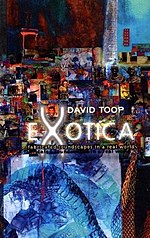Ambient music is a genre of music that emphasizes tone and atmosphere over traditional musical structure or rhythm. A form of instrumental music, it may lack net composition, beat, or structured melody. It uses textural layers of sound which can reward both passive and active listening and encourage a sense of calm or contemplation. The genre is said to evoke an "atmospheric", "visual", or "unobtrusive" quality. Nature soundscapes may be included, and the sounds of acoustic instruments such as the piano, strings and flute may be emulated through a synthesizer.
Post-rock is a form of experimental rock characterized by a focus on exploring textures and timbre over traditional rock song structures, chords, or riffs. Post-rock artists are often instrumental, typically combining rock instrumentation with electronics. The genre emerged within the indie and underground music scene of the 1980s and early 1990s. However, due to its abandonment of rock conventions, it often bears little resemblance musically to contemporary indie rock, borrowing instead from diverse sources including ambient, electronica, jazz, krautrock, dub, and minimalist classical.
Intelligent dance music is a style of electronic music originating in the early 1990s that is regarded as "cerebral" and better suited to home listening than dancing. Emerging from electronic and rave music styles such as ambient techno, acid house, Detroit techno, and breakbeat, it tends to rely on individualistic experimentation rather than specific genre characteristics. Prominent artists associated with it include Aphex Twin, μ-Ziq, the Black Dog, the Orb, the Future Sound of London, Autechre, Luke Vibert, Squarepusher, Venetian Snares, and Boards of Canada.
Dub is a genre of electronic music that grew out of reggae in the late 1960s and early 1970s, and is commonly considered a subgenre, though it has developed to extend beyond the scope of reggae. The style consists predominantly of partly or completely instrumental remixes of existing recordings and is achieved by significantly manipulating and reshaping the recordings, usually through the removal of some or all of the vocals, emphasis of the rhythm section, the application of studio effects such as echo and reverb, and the occasional dubbing of vocal or instrumental snippets from the original version or other works. It was an early form of popular electronic music.
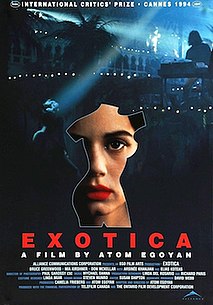
Exotica is a 1994 Canadian drama film set primarily in the fictional Exotica strip club in Toronto. It was written and directed by Atom Egoyan and stars Mia Kirshner, Elias Koteas, Sarah Polley, Bruce Greenwood and Don McKellar.
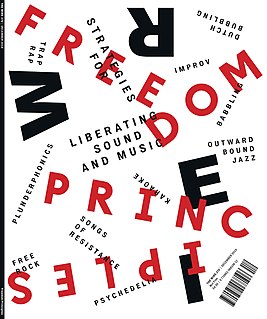
The Wire is a British music magazine publishing out of London, which has been issued monthly in print since 1982. Its website launched in 1997, and an online archive of its entire back catalog became available to subscribers in 2013. Since 1985, the magazine's annual year-in-review issue, Rewind, has named an album or release of the year based on critics' ballots.

David Toop is an English musician, author, curator, and Emeritus Professor. From 2013 to 2021 he was professor of audio culture and improvisation at the London College of Communication. He was a regular contributor to British music magazine The Wire and the British magazine The Face. He was a member of the Flying Lizards.
Urban fiction, also known as street lit or street fiction, is a literary genre set in a city landscape; however, the genre is as much defined by the socio-economic realities and culture of its characters as the urban setting. The tone for urban fiction is usually dark, focusing on the underside of city living. Profanity, sex, and violence are usually explicit, with the writer not shying away from or watering-down the material. Most authors of this genre draw upon their past experiences to depict their storylines.
Exotica is a musical genre.
Peter Cusack is an English artist and musician who is a member of CRiSAP, and is a research staff member and founding member of the London College of Communication in the University of the Arts London. He was a founding member and director of the London Musicians' Collective.
Post-disco is a term to describe an aftermath in popular music history circa 1979–1985, imprecisely beginning with an unprecedented backlash against disco music in the United States, leading to civil unrest and a riot in Chicago known as the Disco Demolition Night on July 12, 1979, and indistinctly ending with the mainstream appearance of new wave in 1980. Disco during its dying stage displayed an increasingly electronic character that soon served as a stepping stone to new wave, old-school hip hop, euro disco, and was succeeded by an underground club music called hi-NRG, which was its direct continuation.
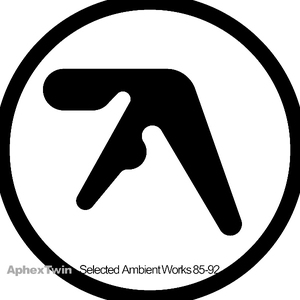
Selected Ambient Works 85–92 is the debut studio album by Aphex Twin, the pseudonym of British electronic musician Richard D. James. It was released on 9 November 1992 through Apollo Records, a subsidiary of Belgian label R&S Records. The album consists of beat-orientated ambient tracks recorded onto cassette reputedly dating as far back as 1985, when James was thirteen to fourteen years old. An analogue remaster of the album was released in 2006, followed by a digital remaster in 2008.
Chillwave is a music microgenre that emerged in the late 2000s. It loosely emulates 1980s electropop while engaging with notions of memory and nostalgia. Common features include a faded or dreamy retro pop sound, escapist lyrics, psychedelic or lo-fi aesthetics, mellow vocals, slow-to-moderate tempos, effects processing, and vintage synthesizers.
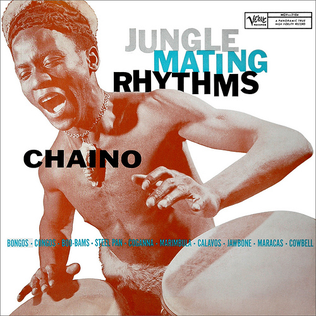
Leon "Chaino" Johnson, the self-styled "percussion genius of Africa," was an American bongo player. After touring for several years on the Chitlin' Circuit, he released several albums and became popular with listeners of exotica music in the late 1950s and early 1960s. In the promotion of his albums, a fictional biography was developed, depicting Chaino as an orphan from a lost tribe in central Africa who had been rescued by a missionary after his tribe had been massacred. Chaino was actually born in Philadelphia and raised in Chicago.

Orienta is an album by The Markko Polo Adventurers released in 1959. The album was produced by Simon Rady, arranged and conducted by Gerald Fried and recorded in stereo in Hollywood, California. The album uses a combination of sound effects and Asian-inspired music to tell humorous vignettes. Its suggestive cover art features a photograph by Murray Laden.
Max Eastley is a British visual and sound artist. He is part of the Cape Farewell Climate Change project. He studied painting and graphic art at Newton Abbot Art School and then went on to gain a BA in Fine Art (1969–1972) at Middlesex University. He is a sculptor (kinetic), musician and composer. His primary instrument is a unique electro-acoustic monochord, developed from an aeolian sculpture. 'The Arc' consists of a single string stretched lengthwise across a long piece of wood which can be played with a bow, fingers or short glass rods. The end of the instrument has a microphone attached so the basic sound can be amplified, recorded and run through sound effect programs.

Ocean of Sound is a 1996 compilation album compiled and produced by English musician and author David Toop. The two-disc, cross-licensed "various artists" compilation contains 32 tracks culled from a variety of musical sources, including dub, exotica, free jazz, and field recordings. Toop compiled the recordings to serve as both a historical survey of ambient music and an aural companion to his 1995 book Ocean of Sound: Aether Talk, Ambient Sound and Imaginary Worlds.
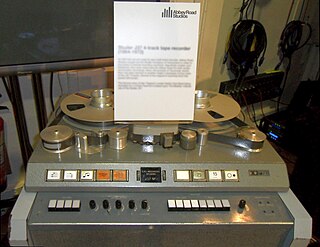
In music production, the recording studio is often treated as a musical instrument when it plays a significant role in the composition of music. Sometimes called "playing the studio", the approach is typically embodied by artists or producers who favor the creative use of studio technology in completing musical recordings, as opposed to simply capturing live performances in studio. Techniques include the incorporation of non-musical sounds, overdubbing, tape edits, sound synthesis, audio signal processing, and combining segmented performances (takes) into a unified whole.

Christgau's Record Guide: The '80s is a music reference book by American music journalist and essayist Robert Christgau. It was published in October 1990 by Pantheon Books as a follow-up to Christgau's Record Guide: Rock Albums of the Seventies (1981).

Jewels of the Sea is a 1961 orchestral exotica album by American composer Les Baxter. The album was inspired by fantasy ideas of the ocean from pop culture, such as mermaids and sea nymphs, sunken ships, and legendary underwater cities like Atlantis. There was an overall erotic element to the album, whose tagline was "Titillating Orchestrations for Listening and Loving", and whose original cover featured actress and model Diane Webber smiling glamorously underwater, apparently naked. Although not explicitly shown wearing a mermaid tail, her makeup and jewellery are styled to be reminiscent of the performing mermaids at Weeki Wachee Springs.
